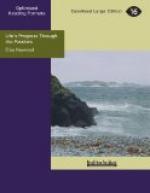All men are born with seeds of good
and ill;
And each shoot forth, in more
or less degree:
One you may cultivate with care
and skill,
But from the other
ne’er be wholly free.
The human mind may, I think, be compared to a chequer-work, where light and shade appear by turns; and in proportion as either of these is most conspicuous, the man is alone worthy of praise or censure; for none there are can boast of being wholly bright.
I believe by this the reader will be convinced he must not expect to see a faultless figure in the hero of the following pages; but to remove all possibility of a disappointment on that score, I shall farther declare, that I am an enemy to all romances, novels, and whatever carries the air of them, tho’ disguised under different appellations; and as it is a real, not fictitious character I am about to present, I think myself obliged, for the reasons I have already given, as well as to gratify my own inclinations, to draw him such as he was, not such as some sanguine imaginations might with him to have been.
I flatter myself, however, that truth will appear not altogether void of charms, and the adventures I take upon me to relate, not be less pleasing for being within the reach of probability, and such as might have happened to any other as well as the person they did.—Few there are, I am pretty certain, who will not find some resemblance of himself in one part or other of his life, among the many various and surprizing turns of fortune, which the subject of this little history experienced, as also be reminded in what manner the passions operate in every stage of life, and how far the constitution of the outward frame is concerned in the emotions of the internal faculties.
These are things surely very necessary to be considered, and when they are so, will, in a great measure, abate that unbecoming vehemence, with which people are apt to testify their admiration, or abhorrence of actions, which it very often happens would lose much of their eclat either way, were the secret springs that give them motion, seen into with the eyes of philosophy and reflection.
But this will be more clearly understood by a perusal of the facts herein contained, from which I will no longer detain in the attention of my reader.
BOOK the First.
CHAP. I.
Shews, in the example of Natura, how from our very birth, the passions, to which the human soul is incident, are discoverable in us; and how far the organs of sense, or what is called the constitution, has an effect over us.
The origin of Natura would perhaps require more time to trace than the benefit of the discovery would attone for: it shall therefore suffice to say, that his ancestors were neither of the highest rank:—that




